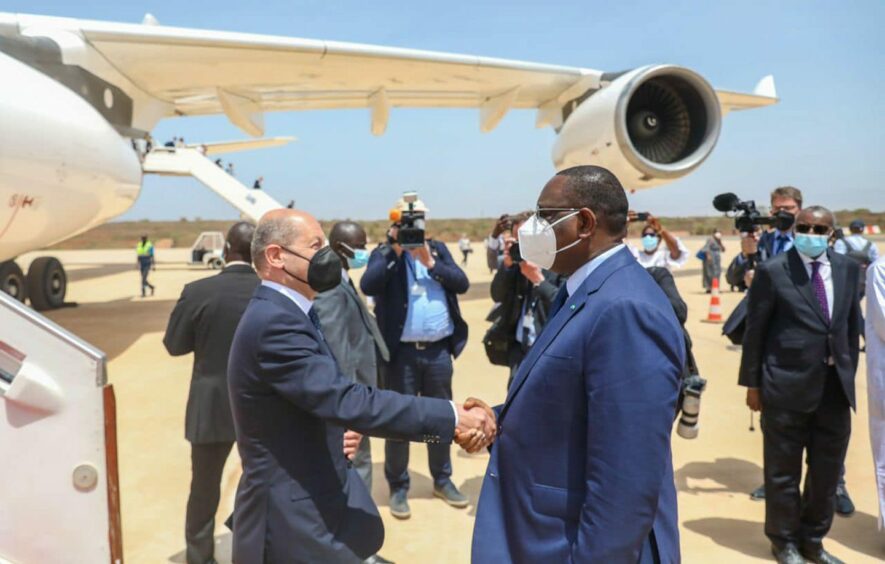
German Chancellor Olaf Scholz attended the launch of a synthetic aeroplane fuel in South Africa today, with his local counterpart Cyril Ramaphosa.
This is the final step of Scholz’s Africa tour. He began in Senegal, then to Niger and ended in South Africa.
Scholz and Ramaphosa witnessed the launch of the Care-o-sene project, involving Sasol and Helmholtz-Zentrum Berlin (HZB). The aim of the project is to develop next generation catalysts to produce sustainable aviation fuel (SAF).
The two heads jointly unveiled a scale model of an FT reactor.
The German Ministry of Education and Research, with Sasol, will fund Care-o-sene, which stands for Catalyst Research for Sustainable Kerosene.
Sasol is working to bring its Fischer-Tropsch (FT) technology to tackle the production of green kerosene on a commercial scale.
Sasol president and CEO Fleetwood Grobler said the company’s expertise “makes us the ideal partner to help Germany and the world decarbonise the aviation sector and make it sustainable over the long-term”.
HZB scientific managing director Bernd Rech said the project was crucial. “This can only be achieved in a global partnership by deeply integrating fundamental research and technology development on an industry relevant scale.”
Care-o-sene will run for three years. It aims to commercialise green kerosene production by 2025. Sasol said its FT catalysts should increase fuel yield process to more than 80%.
Sasol, and South Africa, have made a number of commitments around green hydrogen. Combining hydrogen with sustainable CO2 sources will provide SAF.
“Sasol has committed to a 30% reduction in emissions by 2030,” Ramaphosa said. “A just energy transition is a process that takes place over decades.”
Senegal gas links
Sasol and the SAF plan were not the only energy related discussions from Scholz’s trip. Speaking in Senegal, the German chancellor expressed interest in securing LNG supplies.
BP is leading an LNG development project, in a joint Mauritania-Senegal plan. The Greater Tortue Ahmeyim (GTA) floating LNG (FLNG) project should begin producing in 2023. There are plans to expand beyond the initial phase.
Scholz said he had made a “conscious decision” to go to Senegal first. The chancellor said he was pursuing energy projects in Senegal “intensively”.
While he was in Senegal, Scholz inaugurated a solar power plant with President Macky Sall.
Germany has recently set out plans to provide federal support in the construction of LNG regasification terminals, in a bid to reduce its reliance on Russian pipeline gas.
Arriving in Niger, the German politician talked about security plans.
Finally, he said South Africa was a “key country for political and economic stability” in Africa. “Energy prices, the economy and food security are under pressure from Putin’s war of aggression,” he said.
Scholz has invited Senegal and South Africa to attend the next G7 meeting, in late June.
Ramaphosa and Scholz discussed plans for the financing package, announced at COP in November, to help South Africa move beyond its coal reliance. The South African president said the two had discussed “next steps” in this project.
“This historic partnership will support our just transition to a low-carbon economy and climate resilient society in a manner that leaves no-one behind,” Ramaphosa said.
